How To Get Better at Chess: Ultimate Improvement Guide
While simply playing chess is surely fun and exiting, something in us drives us to constantly get better in the royal game – that’s how I feel at least. It really doesn’t matter whether you’re a total beginner or on the edge of getting your last Grandmaster norm – there is always room for improvement (unless you’re Magnus Carlsen… maybe). But improving your chess skills isn’t a simple task; it is more than just playing the game regularly – I’m sure you’ve noticed that by now! Today, we’ll take a scientific approach to getting better at chess. We’ll break down what exactly it takes to improve and how you can effectively advance your mental pawns (sorry for that analogy). Let’s go!
Getting Better at Chess Takes Time
There is no sugar-coating this: Getting better at chess takes a long, long time. How long? Well, it really depends on three main factors:
- Your current rating – the better you are, the less room there is for improvement
- Your neural plasticity – meaning how well your brain is able to learn, this declines with age
- The amount of (effective) time you invest in getting better at chess
I don’t want to set false expectations. Unless you are a beginner child, you have a long and bumpy road ahead of yourself.
Most people think getting better at chess is a simple, straight-forward process that can be best described with an exponential curve (give me some slack, my design skills are severly lacking):
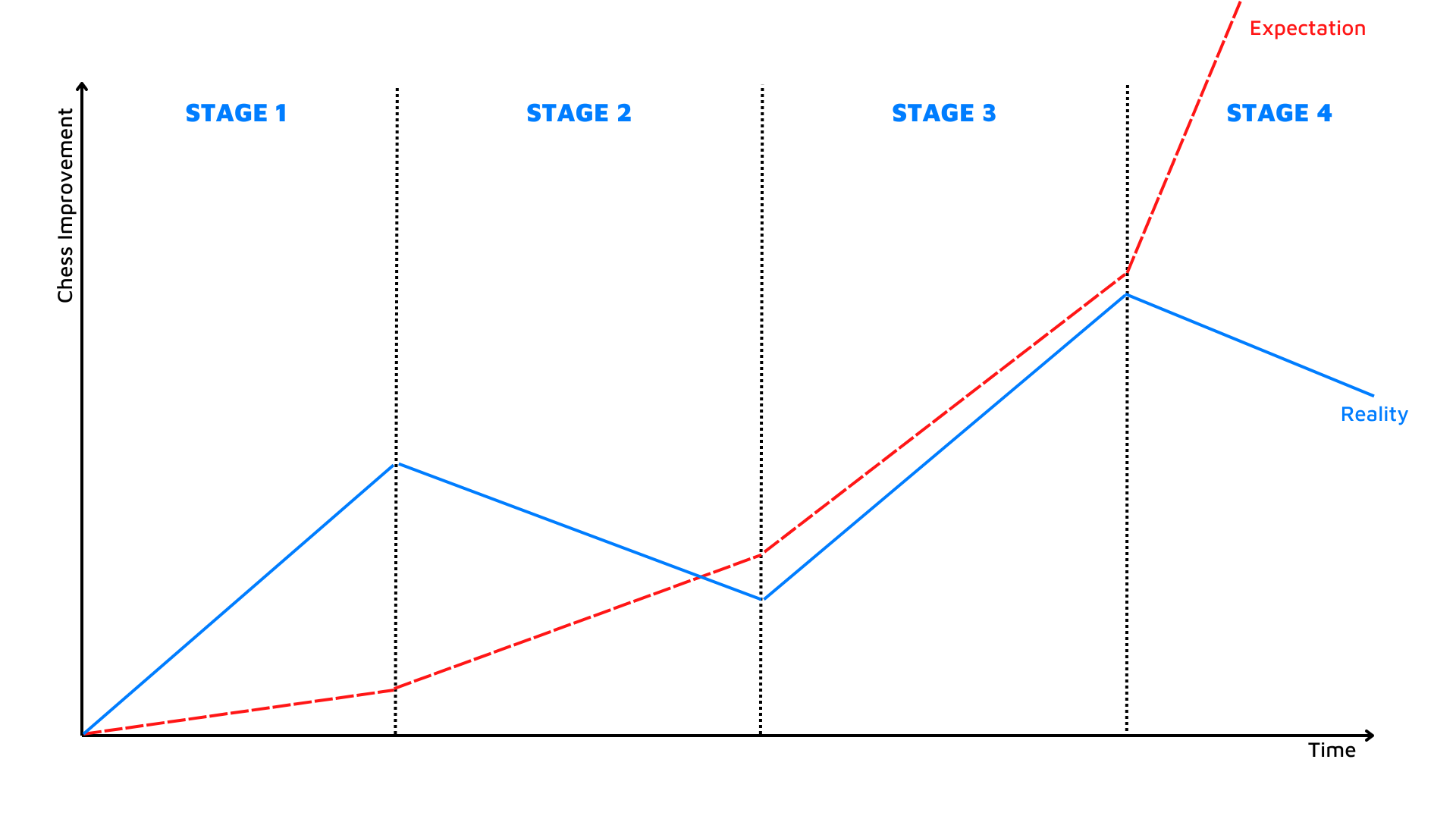
In reality, increasing your chess rating is a hard-earned process with severe up’s and down’s. Some people might never reach their goal.
You will not improve at chess if you are not willing to put in the required work (and a lot of it). Sorry to be so blunt, but it’s the cold, hard truth.
With that out of the way (and if I didn’t scare you enough to stop reading), here are some actual tips to improve your chess and get better at the game.
8 Tips and Strategies To Improve in Every Area of Chess
While the problem of chess improvement really has to be tackled on an individual area level (or are you going to tell a bullet player to improve his deep calculation skills?) there are some “evergreen tips” that work in almost all areas of chess. I uncovered eight of those tips, tricks and strategies you can implement today to improve your chess skills:
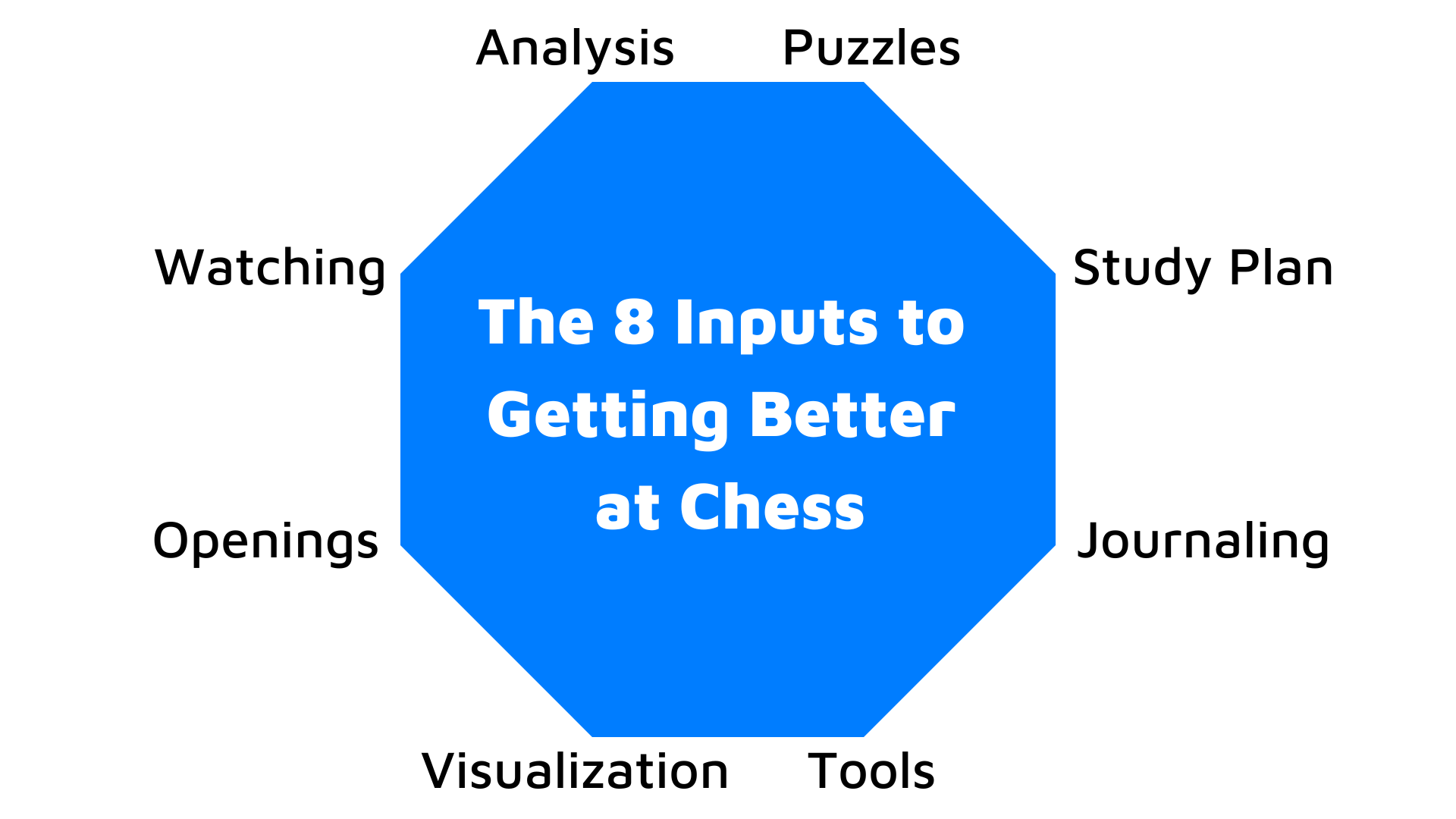
These 8 Inputs are:
- Analysis
- Puzzles
- Study Plan
- Journaling
- Tools
- Visualization
- Openings
- Watching
Let’s discuss them in detail.
Analyse Your Games
I know you don’t want to hear it – I also don’t like sitting down for chess game analysis. But if there is anything close to a magic trick when it comes to getting better at chess, it is analysing your own games.
By reviewing games you played, you will identify your weaknesses and mistakes, and then work on correcting them. In a sense, analysis lays the foundation for improving at chess.
We have a whole article on how to review and analyse your games here on Chessily.
What Tools Can You Use For Game Analysis?
- Chess.com Game Review/Analysis (Freemium)
- Lichess.org Analysis Board (Free)
- Decodechess.com (Paid)
Regularly Play Puzzles
Like the famous German chess master Richard Teichmann once said: “Chess is 99% Tactics”. I couldn’t agree more. Tactical superiority is one of the major building blocks of gaining an advantage in the middlegame.
By solving puzzles regularly, you can sharpen your tactical ability and pattern recognition, which is a real game-changer when it comes to getting better at chess.
In an article on Chessily we already covered the importance of puzzles when trying to get better at chess.
Where To Play Chess Puzzles?
- Chess.com Puzzles, Puzzle Rush and Puzzle Battle (Freemium)
- Lichess.org Puzzles, Puzzle Streak, Puzzle Stormer and Puzzle Racer (Free)
Create and Follow a Study Plan
The value of a study plan is often overlooked, even by experienced players. Which is a real shame. In a study plan, you to set a specific routine, goals and track your progress, which is an immense help to stay consistent and motivated on your chess improvement journey.
Creating a study plan involves setting daily, weekly and monthly training times and goals as well as identifying the specific areas of your chess game that need improvement (and updating them regularly).
This includes things like opening study, puzzle solving, analysis of your own games, or simply consuming chess content online. This breaking down of your studies into manageable chunks, and focusing on specific areas, makes it a whole lot easier to make steady progress towards your goals.
See our guide on creating a chess study plan.
Tools to Create a Study Plan:
Write a Chess Journal
A chess journal… are you serious? Oh yes, absolutely!
As a chess player looking for improvement, keeping a chess journal can be a vital tool for keeping steady progress. It allows you to record your thoughts, observations and insights from your games, puzzles, and studies.
I don’t know about you, but for me it is a whole lot easier to remember things if I wrote them down once (this is also supported by science).
In addition, a journal allows you to track your (mental) progress and identify problematic patterns in your play, which in turn helps you to narrow down on specific areas of improvement.
If you want to learn how to write a chess journal, check out our article on the topic here on Chessily.
Where to Write a Chess Journal:
- The notes app on your phone
- Microsoft Word
- Google Docs
Use Available Chess Improvement Tools
With the growth of online chess, numerous chess improvement tools have flooded the web. Some are not worth the money, others are real weapons to supercharge your chess improvement.
While basically everyone has access to incredibly powerful chess engines nowadays, the real value of those only gets unlocked if you wrap them in a tool that individually assesses one’s chess performance and identifies areas for improvement.
Chess training software, like Aimchess or Chessable, provides you with well-structured training courses, individualized puzzles and other training materials that can help you to improve specific areas of your chess game.
My Favorite Chess Improvement Tools:
Work on Your Visualization Skills
Visualization is the ability to see (and understand) a sequence of potential moves in your mind, without making them on the board. In a further sense of the definition it also includes the anticipation of your opponent’s moves.
To break it down: The better your visualization skills, the further you can calculate ahead. Developing this skill is essential for getting better in chess – it allows you to plan ahead and calculate through different lines and their variations.
Check out our article on developing your visualization skills here on Chessily.
How I Like To Improve My Visualization Skills:
Improve Your Opening Repertoire
It goes without saying that if if you’re serious about improving chess, there is no avoiding opening study. I know it’s boring, but it’s essential.
If you find yourself going into the middlegame with a disadvantage regularly, you should seriously work on your openings. Of course you don’t have to be well-versed in all variations of the most niche openings. But having a solid repertoire to play yourself, as well as knowledge of the most common openings (and their traps) is an absolute must when you want to increase your chess rating long-term.
My Favorite Tools To Get Better at Chess Openings:
- Chess.com’s Opening Explorer
- Lichess’ Opening Explorer
- Various Opening Books
Watch Top-Level Chess Games
Last but not least, we have an improvement tip that is rather easy to implement. I don’t know about you, but I love following chess tournaments and watching top-level players battle it out on the board.
I routinely find myself learning new strategies, tactics, and ideas that help me to improve my own game. Okay, maybe that’s an oversell. But at least it motives me to start playing or studying chess, which is also helpful.
Where I Watch GM’s and Other High Level Play:
- Chess.com
- Chess24
- Agadmator’s Youtube Channel for post analysis
Getting Better at Different Time Formats
Now that we’ve gone through some evergreen chess improvement tips & strategies, I want to take a closer look at how to get better at specific time formats.
As you probably now, there are four major time controls that are played in chess:
- Bullet
- Blitz
- Rapid
- Classical
We’re going to focus on the first three, as they are the most prominent in online chess.
Improving at specific time formats starts with understanding how and what we can influence in order to get better at them
Generally, the shorter the time format, the more importantance lies on theory and deep calculation:
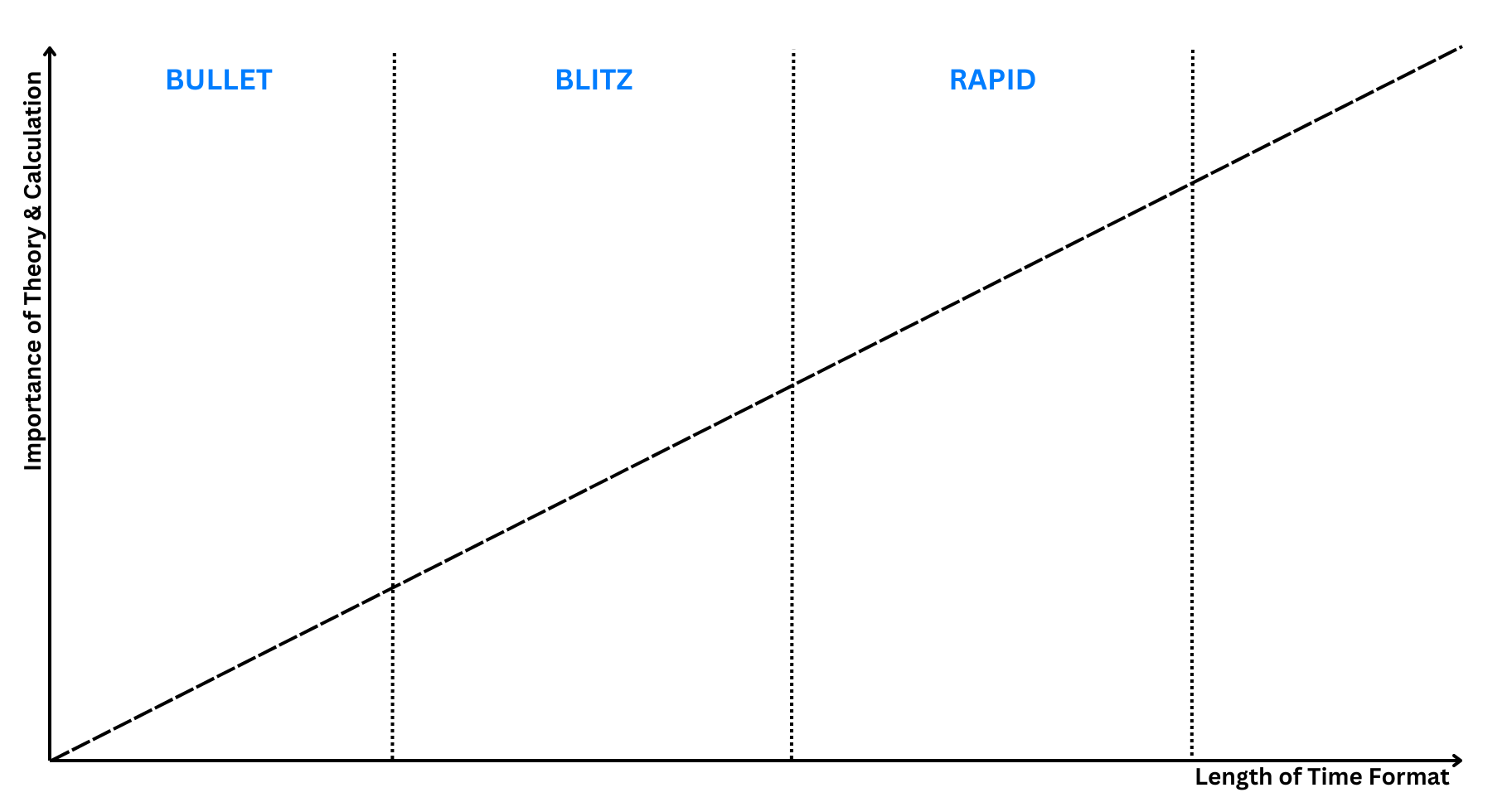
We have to look at chess improvement from an analytical and statistical perspective. In order to do so, we have to actually break down the inputs that go into making you a better player.
I narrowed it down to five inputs we have to work on:
- Deep Calculation
- Theory
- Intuition
- Speed of Play
- Luck
Deep Calculation: This is what most beginner players will think about intuitively. A good chess player can calculate the most moves ahead and can “outthink” an opponent.
Theory: This is the result of boring studying. How well you know openings, tactical motives and theoretical endgames.
Intuition: It is hard to describe intuition in chess, but I would define it as your ability to find the right move without deep calculation.
Speed of Play: Essentially how fast you can blitz out moves on the board or move the mouse in online chess. This ties in heavily with time management and the ability to gain a time advantage over your opponent.
Luck: Sometimes you just get lucky. Your opponent makes a mistake, or you might find a genius move by accident. It’s part of the game. Unfortunately, there is really nothing we can do to improve our luck. But, we can play (and improve in) time formats that require less luck and more skill.
Improve at Bullet Chess
Now we’re going to laser-focus on how to get better at bullet chess. In this time format, you usually have around a minute to play a whole game. Of course, this is incredibly fast.
For this reason, you have less time to calculate your moves and intuition as well as luck play a bigger role:
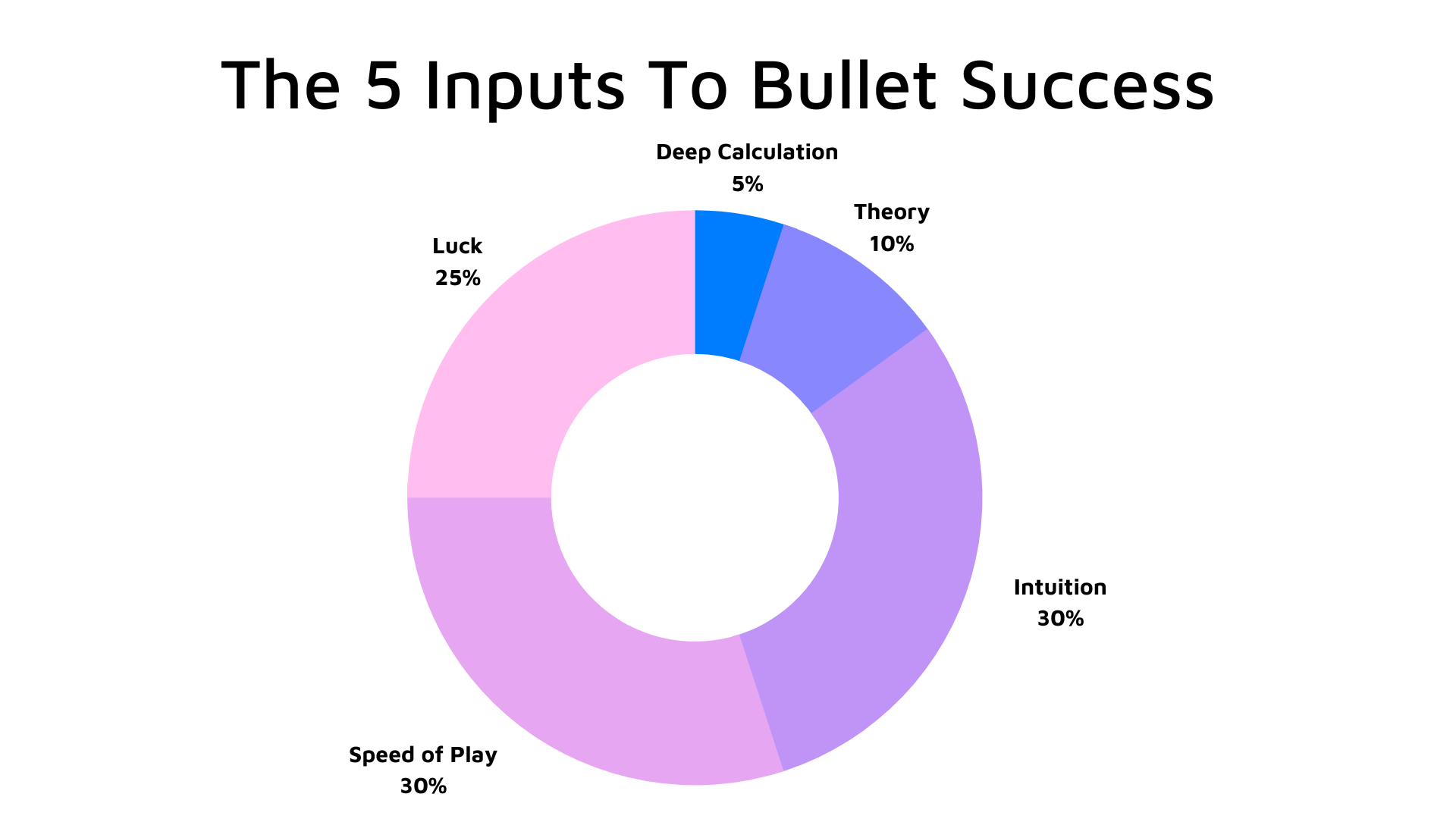
Getting better at bullet chess is arguebly the most difficult part of chess improvement, because it is primarly influenced by areas where we can’t (or hardly) improve upon – how can you improve your luck? Well, you can’t.
So, if you want to become a better bullet player, we have to go at it strategically. Look at the chart and ask yourself – “what areas can I specifically improve in?”.
In my eyes, a good bullet player has to be able to move quickly, have great intuition and be somewhat lucky. Luckily for us, the first can be improved upon quite easily.
Three tips to improve at bullet chess:
- Get a good gaming mouse.
- Play fast-paced puzzles to improve your intuition.
- Have a solid opening repetoire to blitz out the opening.
How To Get Better at Blitz Chess
With Blitz, you have around 3-5 minutes on your clock. It might not sound like much, but that is significantly more than Bullet!
Now you can actually start calculating a bit and using theory to your advantage. Obviously, intuition still plays a big role, especially in the endgame where time usually becomes a bit tight.
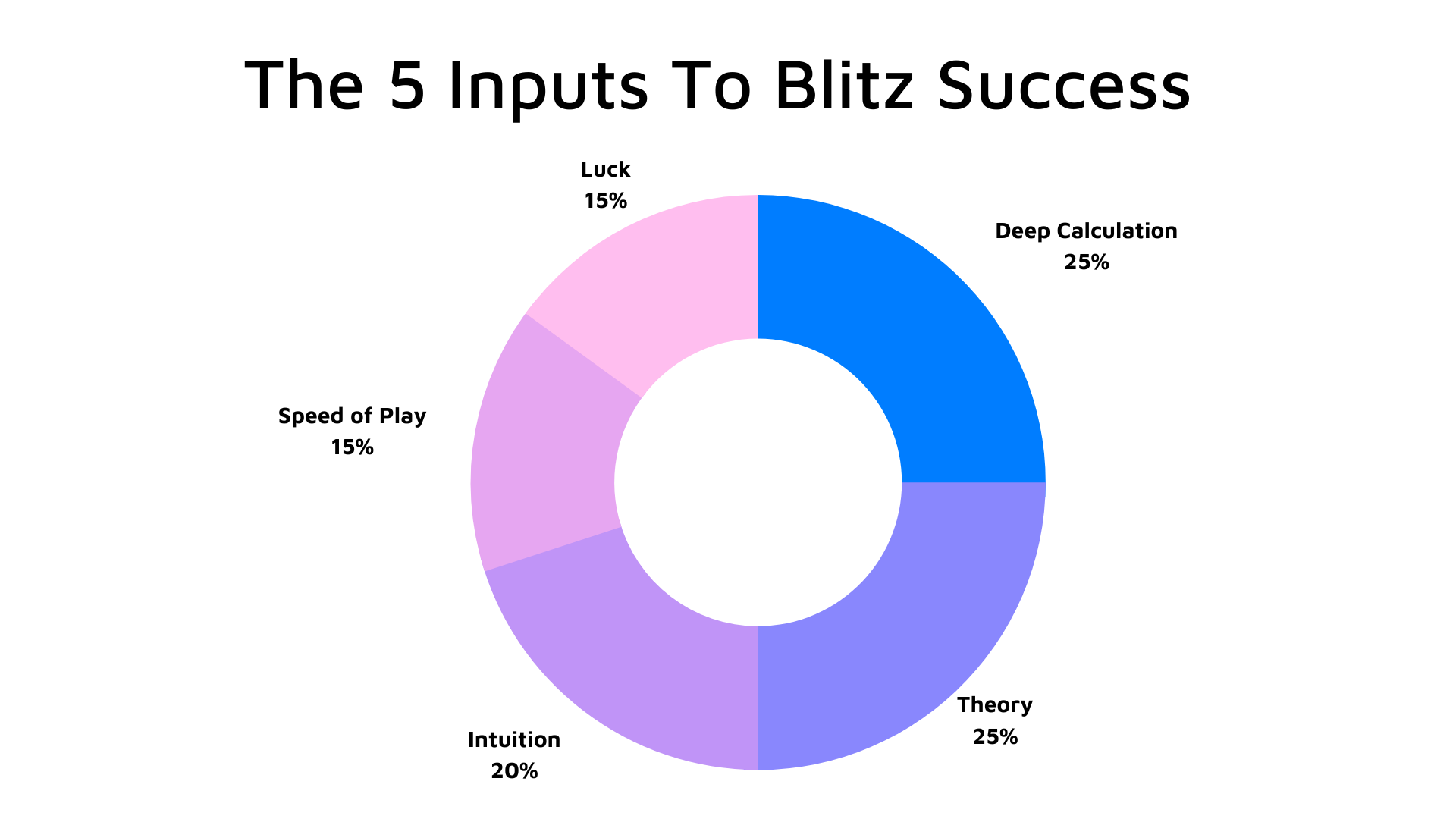
You know the drill by now. What can you do to become a better blitz player? Well – work on what is most important.
Blitz is in a bit of a weird situation where all inputs play a very similar role. So you really have to become good at everything to improve at blitz.
Three tips to get better at blitz chess:
- Have a solid opening repetoire and now endgame theory to not get in time trouble.
- Puzzles can help sharpen your pattern recognition and intuition.
- Good visualization skills are also very helpful.
Improving Your Rapid Chess Skills
Longer time controls like Rapid (and Classical chess) start from 10 minutes and above on the clock. That is usually enough time to calculate a few moves ahead in most positions.
Also, running out of time becomes less and less of an issue, as Rapid games are usually played with increment, meaning you will gain time for each move you make.
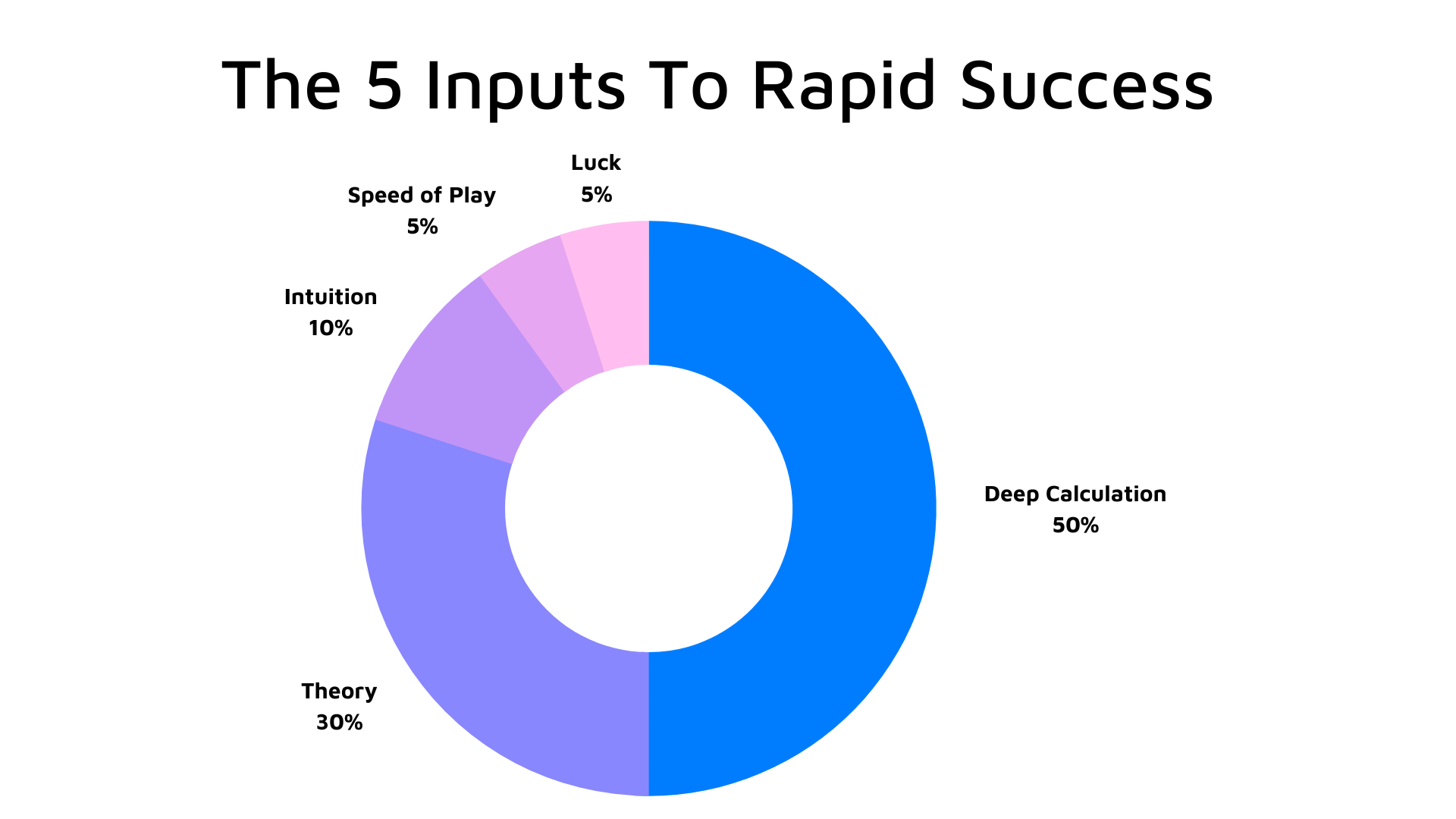
With those facts in mind, we can start to form a picture of what it takes to become a better rapid player.
Obviously you need to be able to calculate ahead – now that you have the time for it. Also, opening and endgame theory become more important as you also face better prepared opponents. Intuition still plays a minor role, but is far less important than the calculation of various lines and their variations.
Speed of play and luck are not areas of focus if you want to get better at Rapid chess.
Three tips to improve your rapid chess skill:
- Have excellent visualization skills that allow you to calculate far ahead.
- Improve your opening repetoire and endgame theory.
- Puzzles will increase your ability to spot tactical motives and patterns quickly.
How To Get To 1000 Elo Rating
If you are on your way to breaking out of the beginner stage and reaching 1000 rating points, you should focus on:
- Don’t fall for common opening traps and learn how to punish early queen advanced by your opponent
- Be mindful of when you’re capturing pieces; don’t just capture because you have the possibility to
- Avoid blundering by having a “pre-move-checklist”
Gotham Chess has an excellent video on exactly these points:
So, you might be wondering how long it takes to reach 1000 rating in chess? Usually, a total beginner can reach an Elo of 1000 within 2-3 months of dedicated training and studying.
Reaching a Chess Rating of 1200
If you are below 1200 rating points, you should focus on:
- Learn to deal with your back rank and avoid back rank checkmates
- Learn common endgames, especially king and pawn endgames by heart
- You have to stop blundering, for example by using a pre-move-checklist
Check out this video by ChessVibes that goes into detail on these topics:
A common question is how long it takes to reach a rating of 1200 in chess. With enough motivation and dedication an adult beginner can reach 1200 in about 6 months of training chess.
Advancing To a 1500 Elo Rating
1500 is a real milestone for every chess player. If you’re currently below that rating, you might want to work on:
- Play both sides of the board – try to think what your opponents plan is
- Know your openings – don’t get caught out against a well-prepared opponent
- Still, you have to stop blundering (again, have a pre-move-checklist)
Again, Levy Rozman has a great video covering the steps to reaching 1500 Elo points:
With 1500 Elo being such an important rating benchmark, you might be asking yourself how it would take you as a complete beginner to reach it. In my experience, you can reach the goal of a 1500 chess rating within 1-2 years of practicing.
We have a full guide on how to reach 1500 rating points here on Chessily.
How To Get To a 1800 Elo Rating in Chess
With an Elo rating of 1800 you are widely considered an advanced player. While it is a tough road to get there, these tips might help you reach your goal:
- Optimize your piece improvement plan – ask yourself “what is my worst placed piece at the moment?”
- Have a solid opening repetoire and know individual variations and their traps
- Avoid calculation mistakes by sharpening your visualization skills
Chess Talk has a good video that might help you break through that magical 1800 line:
Not a lot of people ever even get to close to an Elo rating of 1800 points. But how long would it take in theory? If you’re willing to put in the work, you can reach 1800 rating points in about 2-3 years of dedicated study, if you’re a complete adult beginner.
What To Do When You’re Stuck on a Rating
Being stuck at a certain chess rating can be incredibly annoying and make you lose interest in the game fast – we all want to improve, right?
It is hard to give concrete advice, because the reason you’re stuck at a certain Elo is different from person to person, as well as the level they’re stuck at.
But, Levy Rozman took the time to individually help 5 players (all stuck at a different rating level), to break their plateu. I highly recommend you watch his video on the topic:
Chess Improvement Articles To Make You a Better Player
We have a ton of useful tips & tricks here on Chessily to make you a better chess player. You can browse through all of them here:
- How to Overcome Chess Plateaus: Tips for Breaking Through
- The Most Common Chess Mistakes and How to Avoid Them
- Are Puzzles Useful For Chess Improvement?
- Why Am I So Bad at Chess? And What To Do About It
- How To Stop Blundering in Chess
- How To Improve at Rapid Chess
- How to Get Better at Bullet Chess
- How To Get To 1500 Rating in Chess: A Practical Guide

